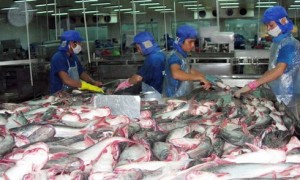Here is a quandary for you: should seafood be regulated as agriculture or as food? For Members of Congress, that hasn’t always been as obvious as it might seem to ordinary people. You see, the Department of Agriculture has jurisdiction over meat, poultry, and eggs, but all other food is regulated by the Food and Drug Administration (FDA), part of the Department of Health and Human Services. It was once thought USDA jurisdiction made sense for animals and animal products, but not for fruit, vegetables, or grains – only food that comes from animals.
 What about fish? Today a large portion of the nation’s seafood comes from farms, too. And so there was a big debate in Congress a decade ago about the regulation of catfish, which are mostly farm-raised. Showing its usual inability to make such tough decisions, Congress decided to add catfish to the USDA’s jurisdiction, but not remove it from the FDA’s.
What about fish? Today a large portion of the nation’s seafood comes from farms, too. And so there was a big debate in Congress a decade ago about the regulation of catfish, which are mostly farm-raised. Showing its usual inability to make such tough decisions, Congress decided to add catfish to the USDA’s jurisdiction, but not remove it from the FDA’s.
Realizing the wasteful cost of such duplication, you might wonder what Congress was thinking. That gives more credit than is due, however. The duplication was created as a last-minute rider on the 2008 Farm Bill, without any debate in either House. Almost no congressman or senator knew they were voting to duplicate catfish regulation. The bill had already passed both Houses, but the catfish provision was not in either version. Instead, members of a conference committee appointed to resolve minor differences between the two versions of the bill added the catfish clause on their own. That is a violation of the rules of both Houses of Congress, by the way, and Members in either House could raise a point of order about it. But almost nobody knew the catfish provision was there, so nobody said anything, and it became law.
Since that hasty maneuver in 2008, the General Accounting Office has recommended ten times that Congress resolve the matter by repealing this regulatory duplication, said to cost $30 million to set up and $15 million annually thereafter. Ten times Congress has ignored that advice. Until now. Now it seems that the USDA has finally gotten around to enforcing its control over catfish farms, and published new guidance on how the process will work. Catfish farms across the South have begun an arduous and expensive process of creating duplicated paperwork, employees, facilities, and processes to comply with both USDA and FDA regulations – which will not be the same.

In case you are wondering, there is no food safety issue involved. Even USDA, while finalizing its plans to carefully regulate the industry, calls catfish “low risk,” so that the effectiveness of its regulations is “unknown.” So citizen watchdog groups, taxpayer advocates, and consumer groups have organized a major effort in Congress to put a stop to the wasteful and costly duplication. A resolution disapproving the new USDA catfish rules has already passed the Senate (with the support of a wide array of Senators from both parties), and a similar measure is awaiting a vote in the House (with a similar bipartisan coalition of support).
Two nagging questions remain. First, if Congress gave this direction to the USDA six years ago why has it not been implemented already? Is Congress unaware that its vague directions are often so inexplicable that it takes a government agency years to figure out what to do? To ask the question is to answer it. Second, why is the solution still so controversial? House leadership has been extensively lobbied by both sides this week, and has still not decided to allow a vote. That is because – wait for it – the large catfish growers and their congressional delegations do not want the duplication ended.
Sound fishy? Would growers actually want difficult, expensive, duplicative, and burdensome regulations? Well, maybe not for themselves, but they certainly want it for their competitors. It turns out that the primary reason for the mess is that growers face increasing competition from foreign importers. And one result of the duplicated regulation would essentially ban catfish imports, because of the inability of importers to meet some of the requirements. So a small but powerful minority of congressmen from the Deep South have marshalled their influence to block a House vote on repealing the catfish clause.
This isn’t the first time a particular industry has used the power of government to delay and hinder competition. But Congress, in all-too-rare bipartisan form, is poised to do the right thing on this one.
(A version of this column originally appeared in the Grand Junction Daily Sentinel June 24, 2016)




Comments on this entry are closed.